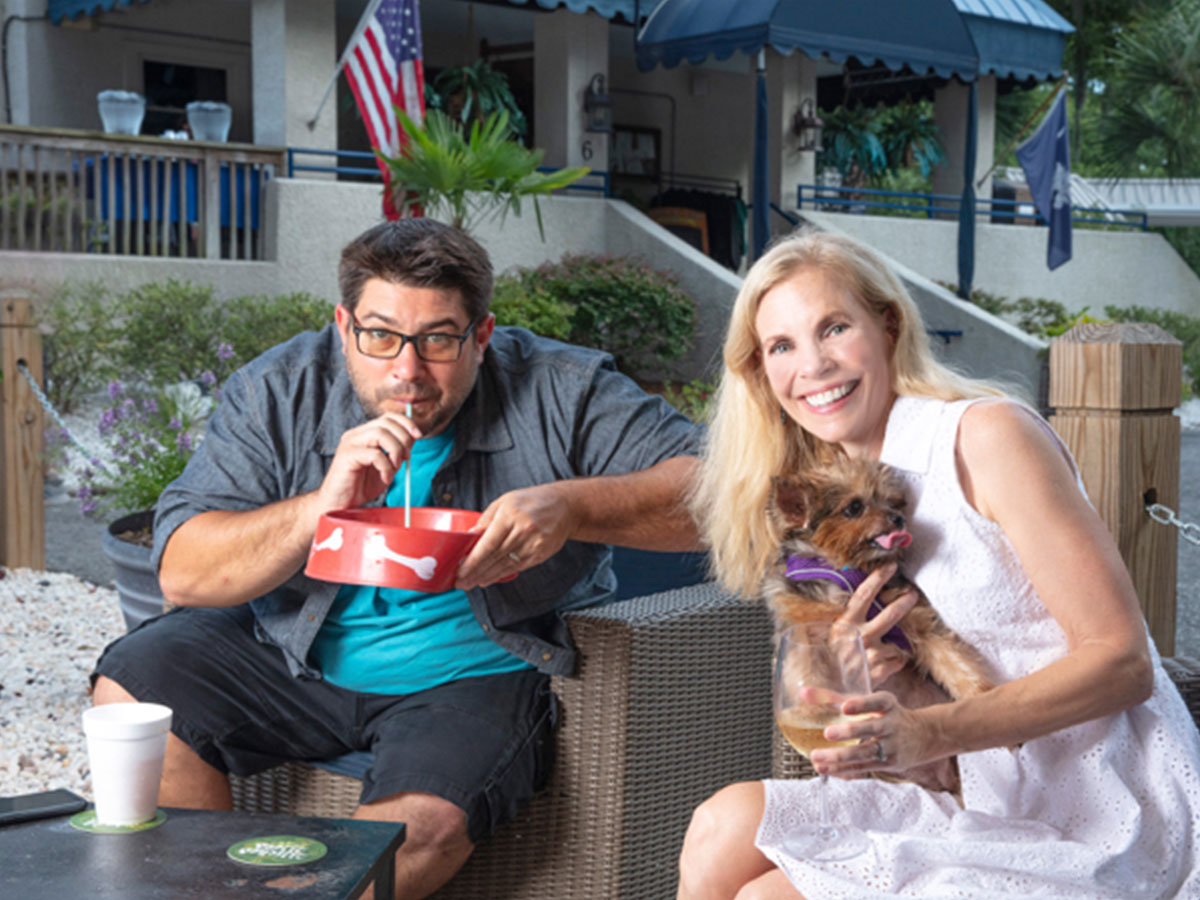Franny Gerthoffer has been the face of Hilton Head Humane Association for as long as most of us can remember. This issue being decidedly woman-centric, and with a new facility in partnership with Beaufort County having recently opened, it seemed like a good time to catch up with her and her sidekick, Storm, over drinks at the dog-friendly outdoor bar at Captain Woody’s.
While Storm held court, we discussed the perils of dog ownership, the impact of the new facility, and that time she (maybe) almost went to jail for trying to protect an animal.
Barry Kaufman: Who do we have here?
Fran Gerthoffer: This is Storm, a little Yorkie mix from down at the shelter. She represents some of the hospice type animals that we have. She’s battling two forms of cancer, so we’re trying to give her the best last six months or so of her life possible. And we invite people to maybe join that type of program if they have it in their hearts to do something like that.
My husband and I have always done it. But we find ourselves with more and more older animals that are being relinquished to the county shelter for those reasons—medical problems.
She’s having a great time. She comes to interviews, she’s been on TV, she’s been to the beach, she loves the ocean, she has her spa days…. She’s doing everything in these last few months, or however long she has, that she maybe hasn’t done her whole life.
BK: What is the sum total of pets at home?
FG: I’ve always had five [dogs] and five [cats], but a lot has changed in the 13 years that I’ve been with the animal shelter. Now I have three more dogs at home and this one. We’re dwindling down a little bit, but all of them have special needs.
BK: It has to be hard to draw the line and say, “I’m not taking this one home.”
FG: It’s very hard to draw that line. What my teammates have done very well is, when they need me to cross over the line and assist them, they put someone like that in my office. I get used to them being around, then it’s hard for me to say no. That’s what happened with Storm. She did so well under my desk, sitting on my feet and being good with everyone, I thought, “How hard could it be?” She’s very demanding at home. But she’s worth every minute, honestly.
BK: She seems very well behaved.
FG: (Laughs) Ahh … no. We’ve had our dinner and taken our walks to burn off some energy prior to coming here. But she is a good little dog.
BK: What’s one thing about pet ownership you wish everyone knew?
FG: I think that people have to be ready for that lifelong commitment. Even with these types of dogs. Storm has technically six months, but I’ve had animals in a hospice situation who have lived several years. People have to be ready for the fact that once they get out of a shelter environment and get into that warm, loving home with a good routine and attention, it adds years to their life. People have to be ready for the fact that if you adopt a puppy or a kitten, you’ll have it for the next 14-15 years. You have to think about where you are now and where you are going to be, and your animal has to come with you.
The second thing is, once they adopt a puppy or kitten and it’s a little bit rambunctious or not the best animal, then right away they want to get another one to calm the first one down. We encourage them to train the first puppy, because the second puppy is going to do the same things the first one did. With cats it’s a little different. They may not even cohabit very well. They might go their separate ways in the household.
I also think you have to be ready for something that may happen in your life. Have that backup plan: what about your animals, who will take care of your animals, as opposed to relinquishing them to a shelter. Personally, my animals are all in my will, and someone else who’s much younger than I am will take my animals if anything should ever happen to me or my husband. You don’t want to think like that, but you want to prepare.
BK: It has to be tough to see someone who came into it without planning and is giving up their animal.
FG: I used to just let loose verbally. But that was back in my days of being stupid and immature. Now, all I do is repeat back what they say to me. They’ll say, “I don’t want my dog anymore because it’s too this or it’s too that.” I’ll repeat it and they’ll get upset. I’m just repeating what they said. Before I matured, I’d say, “Are you serious? Who thinks like that? Didn’t your mama teach you better?”
One woman dropped off a cat in a bag and said she didn’t want it anymore. I said, “Now hold on a minute. I need to know a little bit.” She just dropped the bag and started to run off. I chased her down and had a very loud conversation in the parking lot. But I don’t do those things anymore.
BK: Seems like you’ve mellowed a bit.
FG: True story, somebody called and told me about a black Pomeranian in one of those high-rise condos in Palmetto Dunes that they thought had come from us, and it was not in a good situation. So, I went up there with a clipboard and a pen and knocked on her door. I was just being all official—told her to sign here. It was a release form. I’ve gone a lot of places with a clipboard and a pen. I don’t go over all the ins and outs of the release form; I just have it on my clipboard and ask them to sign it and then I get whatever dog or cat out of there. You have to do it legally. You can’t just steal it.
Maybe I was in front of a judge back in the day. Maybe I was told, “Franny, you’re going to go to jail if you don’t stop.” Maybe I harassed somebody to get an animal back that I didn’t think they should have anymore because I had evidence of them not treating it right. And he wouldn’t give it back, so maybe I called his work every day, maybe I wrote him a letter. Maybe I went to a judge and told him this is the evidence I have, and this is how the dog is being treated. I just want to get the dog out of a bad situation, and maybe she’s the one who said to me, “That’s harassment and you’re going to go to jail.”
I wouldn’t last one day in jail, so that’s when I matured. That was a wake-up call.
I understand now when people come into the shelter and yell at me. They’ll say, “You’re not going to give this dog back to the owner, are you?” First, I have to figure out who the owner is then figure out the situation; I don’t know what I want to do. And they’ll get mad at me. You found this animal; I have to do my due diligence. That’s how it works. But I understand why they’re yelling, because that was me 13 years ago. I get it. I don’t get upset with them personally, because I know it’s coming from a good place.
BK: Are you more a dog person or a cat person?
FG: I would say that I’m both, but believe it or not, I’m highly allergic to cats. So, it’s been a little bit of a challenge.
BK: It’s an interesting line of work you’ve chosen for yourself considering that.
FG: Exactly, and my doctors have said the same thing—that maybe I should consider another form of employment. I’m on very good medicine and inhalers, and the cats I have had have been mostly outdoor cats. That’s kind of saved me. But at the shelter, I avoid spending a lot of time where the cats are. I suffer through it, and I’m okay. But if I don’t have to suffer through it, I’d rather not.
But I love them. We have kittens in the office, and we let them run around and play for a few hours before we open to the public. Kittens and cats are really very soothing.
BK: Tell me a little bit about the new facility.
FG: We’re excited about the new facility. It represents seven years of partnership with Beaufort County Animal Services. Beaufort County’s shelter was in need of a big re-do, and we have our clinic. We’ve always helped each other, but we’ve traveled all over from Ridgeland to Beaufort to Hilton Head, back and forth all the time. So, somebody way smarter than I am thought it would be a good idea if we were all together. That’s what started this plan.
It’s a lot when you think about a public/private enterprise; putting those two entities together is not always easy because governments and nonprofits are run very differently. But there’s a common goal of saving the animals, so that’s what kept us going.
Plus, Tallulah Trice is the director out at Beaufort County and she and I have become fast friends. You get two strong, crazy Irish women together, good things happen. But it was not an easy go, and Tallulah will tell you the same thing. We had to learn about each other. But it was worth every bit of it and I respect her to the end. She’s remarkable.
Because of that and the hard work and the planning—seven years of planning—we were able to build those three different buildings. Beaufort County has their building, our clinic moved to that facility and it’s actually our second adoption center.
That facility opened up a whole new world for all of us. We’re able to move a lot more animals through the system. It’s a lot easier to bring them in, get them vetted and get them to an adoption center. It’s been a turnover that has increased our input and output, but beyond that, those buildings are equipped with anything you’d want from an animal rescue facility, from the way the air is filtered to the way the kennels open. Everything is just fabulous.
And the clinic is equipped with everything you’d ever need, with lift tables and surgery tables and the best lights. The Community Foundation donated an X-ray machine, and vets around the island have donated equipment like blood pressure monitors—everything you need to make surgery very easy. So now a dog or cat who is hit by a car is immediately filtered through the clinics so we can save its life, where other times it might have needed to sit for a while until you could find someone to assist.
That whole campus has made a tremendous difference for Beaufort County. And it’s a hurricane-proof building, so we will be a waystation for those kinds of events when we’re not going to be directly affected but other organizations and states are.



